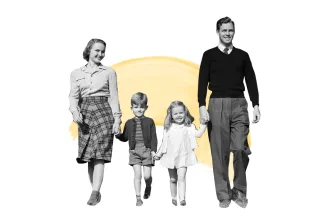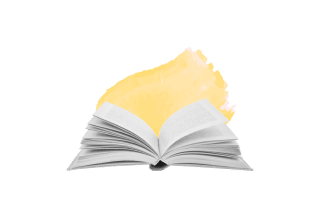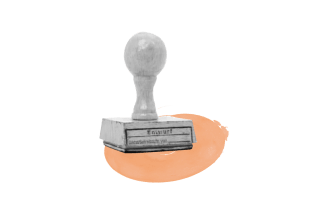Name Directory by Last Name: Last Names Starting with Fa
Explore millions of names to discover rich genealogical details and uncover your family's history
Enter a name to research
Last name meanings and origins
- Farrell
The surname Farrell has its roots in Ireland, deriving from the Gaelic name "O'Fearghail," which means "descendant of Fearghal." The name Fearghal itself is composed of the elements "fear," meaning "man," and "gal," meaning "valor" or "bravery." The Farrell family is believed to have originated in the province of Ulster, particularly in County Cavan, where they were known as a prominent Gaelic clan. Over time, the surname spread throughout Ireland, particularly during the 17th century, as many Irish families faced displacement due to English colonization and the subsequent upheaval of the Irish Wars.
- Farmer
The surname Farmer has its historical roots in the Old French term "fermier," which referred to a tenant farmer or someone who cultivated land. This term was adopted into Middle English after the Norman Conquest of England in 1066, marking the surname's first appearances in historical records.
- Fairbanks
The surname Fairbanks has its historical roots in England, particularly in the region of East Anglia. The name is believed to derive from the Old English elements "faeger," meaning "fair" or "beautiful," and "banc," which refers to a bank or hill.
- Farley
The surname Farley has its historical roots in England, deriving from the Old English elements "fearn," meaning "fern," and "leah," meaning "clearing" or "meadow." This suggests that the name originally referred to someone who lived near a fern-covered clearing or meadow, indicating a close relationship with the natural landscape. The earliest recorded instances of the surname date back to the medieval period, with variations appearing in different regions.
- Faure
The surname Faure has its historical roots in France, deriving from the Old French word "faure," which means "smith" or "blacksmith." This occupational surname first appeared in the medieval period, particularly in the 12th century, when surnames began to be adopted as a means of identification. The blacksmith was a vital figure in medieval society, responsible for crafting tools, weapons, and horseshoes, which made the trade both respected and essential.
- Faulkner
The surname Faulkner has its roots in medieval England, deriving from the Old French word "fauconier," which means "falconer." This occupational surname first appeared in the 12th century, particularly in regions where falconry was a popular sport among the nobility. Falconers were responsible for training and handling birds of prey, a skill that was highly regarded and often associated with the upper classes.
- Fay
The surname Fay has its historical roots in both English and French origins, deriving from the Old French word "fée," meaning "fairy" or "elf." This suggests a connection to folklore and mythology, where individuals with this surname may have been associated with magical or enchanting qualities. The surname first appeared in England after the Norman Conquest of 1066, as many French names were introduced into the English lexicon.
- Farr
The surname Farr has its historical roots primarily in England, where it is believed to have originated from the Old French word "fer," meaning "iron." This suggests that the name may have been occupational, referring to someone who worked with iron or was involved in metalworking. The surname first appeared in historical records during the medieval period, with variations in spelling such as "Farr," "Farre," and "Farrar" emerging over time.
- Farkas
The surname Farkas has its roots in Eastern Europe, particularly among Hungarian and Slavic populations. The name is derived from the Hungarian word "farkas," which means "wolf." Historically, surnames often reflected characteristics of the bearers, and in this case, the association with the wolf may suggest traits such as strength, cunning, or a connection to nature.
- Farrar
The surname Farrar has its historical roots in England, deriving from the Old French word "ferrier," which means "blacksmith." This occupational surname first appeared in the medieval period, particularly after the Norman Conquest of 1066, when many French words and customs were integrated into the English language and society. The Farrar name was often associated with individuals who worked with iron, a vital trade in medieval communities, reflecting the importance of blacksmiths in crafting tools, weapons, and horseshoes.
- Falk
The surname Falk has its historical roots in various European cultures, particularly in Germany and Poland, where it is derived from the Middle High German word "valke," meaning "falcon." This avian association suggests a connection to nobility or a keen sense of observation, traits that were highly valued in medieval society. The surname likely first appeared in the 12th century, with individuals bearing the name often associated with roles such as falconers or those involved in hunting, which was a popular pastime among the aristocracy.
- Fabre
The surname Fabre has its historical roots in France, deriving from the Old French word "faber," which means "smith" or "craftsman." This occupational surname first appeared in the medieval period, particularly in the 12th century, as a way to identify individuals based on their trade. The Fabre family name is often associated with blacksmiths or metalworkers, reflecting the importance of these skills in medieval society.
- Fawcett
The surname Fawcett has its historical roots in England, with origins tracing back to the medieval period. It is derived from the Old French personal name "Fauchet," which itself comes from the word "faucon," meaning "falcon." This suggests that the name may have originally been associated with someone who was a falconer or had a connection to the sport of falconry, a popular pastime among the nobility during the Middle Ages.
- Faber
The surname Faber has its historical roots in the Latin word "faber," meaning "smith" or "craftsman," which reflects the occupation of metalworking that was vital in medieval society. The name first appeared in various forms across Europe, particularly in Germany and France, during the Middle Ages, when surnames began to be adopted based on trades or professions.
- Fagan
The surname Fagan has its historical roots primarily in Ireland, deriving from the Gaelic name "O'Faodhagain," which means "descendant of Faodhagain." The name itself is believed to be derived from the word "faodh," meaning "a raven," which may have symbolized a connection to the natural world or certain traits associated with the bird, such as intelligence or adaptability. The Fagan family is thought to have originated in the province of Ulster, and over time, the surname became associated with various occupations, including farming and trade, reflecting the agrarian lifestyle of many Irish families.
- Farrow
The surname Farrow has its historical roots in England, with its earliest appearances dating back to the medieval period. The name is believed to derive from the Old English word "fearn," meaning "fern," which suggests a connection to nature or specific geographical features, such as areas abundant in ferns.
- Fair
The surname Fair has its historical roots primarily in England, where it is believed to have originated as a descriptive surname. The name is derived from the Old English word "fæger," meaning "beautiful" or "fair," which was often used to describe someone with a pleasing appearance or a fair complexion.
- Faust
The surname Faust has its historical roots in Germany, deriving from the Middle High German word "vust," meaning "fist" or "clenched hand." It is believed to have originated as a nickname for someone with a strong or aggressive demeanor, or possibly for a person who was a skilled fighter. The name first appeared in written records in the 13th century, particularly in regions such as Bavaria and Swabia.
- Fairchild
The surname Fairchild has its historical roots in England, with its earliest appearances dating back to the medieval period. The name is derived from the Old English elements "fæger," meaning "fair" or "beautiful," and "cild," meaning "child." This suggests that the surname may have originally been a nickname for a beautiful child or a term of endearment.
- Farnsworth
The surname Farnsworth has its historical roots in England, particularly in the northern regions, where it is believed to have originated during the medieval period. The name is derived from the Old English elements "fearn," meaning fern, and "worth," meaning homestead or enclosure.
- Fallon
The surname Fallon has its roots in Ireland, deriving from the Gaelic name "O'Fallamhain," which means "descendant of Fallamhain." The name is believed to have originated in the province of Connacht, particularly in County Galway, where the O'Fallamhain family was prominent in the medieval period. The name itself is thought to be derived from the word "fall," meaning "leader" or "ruler," suggesting that the original bearers of the surname may have held positions of authority or influence within their communities.
- Farris
The surname Farris has its historical roots primarily in England and Ireland, with variations also found in other regions. The name is believed to derive from the Old French word "ferrier," meaning "blacksmith," which indicates that the original bearers of the surname may have been involved in metalworking or related trades.
- Farrington
The surname Farrington has its historical roots in England, with its earliest appearances dating back to the medieval period. The name is believed to derive from the Old English elements "fearn," meaning fern, and "tun," meaning settlement or enclosure, suggesting a geographical origin related to a settlement near ferns or a fern-covered area.
- Fanning
The surname Fanning has its historical roots in Ireland, particularly associated with the Gaelic name "Ó Fionnain," which translates to "descendant of Fionnán." The name Fionnán itself is derived from the word "fionn," meaning "fair" or "white," suggesting a connection to physical traits or perhaps a notable ancestor known for their light complexion or hair. The Fanning family is believed to have originated in County Tipperary, where they were part of the Gaelic nobility.
- Favre
The surname Favre has its historical roots in the French-speaking regions of Europe, particularly in France and Switzerland. It is derived from the Old French word "fabrice," meaning "craftsman" or "smith," which indicates that the original bearers of the surname were likely involved in metalworking or other skilled trades.
- Faye
The surname Faye has its historical roots primarily in France, where it is believed to have originated from the Old French word "fae," meaning "fairy" or "elf." This connection to mythical beings suggests a cultural significance tied to folklore and nature, possibly indicating that early bearers of the name were associated with enchanting qualities or a connection to the land. The surname began to appear in written records during the medieval period, particularly in regions of Normandy and Brittany, where it was often linked to local nobility or landowners.
- Farnum
The surname Farnum has its historical roots in England, with its earliest appearances traced back to the medieval period. The name is believed to derive from the Old English elements "fearn," meaning "fern," and "ham," meaning "home" or "village," suggesting a geographical origin related to a settlement characterized by ferns.
- Fahey
The surname Fahey has its roots in Ireland, particularly associated with the Gaelic name "Ó Fathaigh," which translates to "descendant of Fathach." The name Fathach is believed to mean "prophet" or "sorcerer," suggesting a connection to spiritual or mystical roles in early Irish society. The Fahey surname first appeared in historical records in the 12th century, primarily in the province of Connacht, where the family was part of the Gaelic nobility.
- Fairfax
The surname Fairfax has its roots in medieval England, deriving from the Old French term "fayr" meaning "fair" or "beautiful," combined with "faxe," which refers to a "hair" or "hairy." The name first appeared in the 12th century, particularly in the Yorkshire region, where it was associated with the landowners and the gentry. The Fairfax family rose to prominence during the 16th and 17th centuries, particularly during the English Civil War, when Sir Thomas Fairfax became a notable military leader for the Parliamentarians.
- Falconer
The surname Falconer has its historical roots in medieval Scotland, deriving from the Old French word "fauconier," which means "falconer" or "one who trains falcons." This occupational surname first appeared in the 13th century, particularly in regions where falconry was a popular sport among the nobility. Falconry was not only a pastime but also a symbol of status and skill, and those who practiced it were often associated with the upper echelons of society.
- Farnham
The surname Farnham has its historical roots in England, deriving from the Old English elements "fearn," meaning fern, and "ham," meaning homestead or village. This suggests that the name originally referred to someone who lived near a homestead characterized by ferns, likely in a rural setting.
- Fabian
The surname Fabian has its roots in the Latin name "Fabianus," which is derived from "faba," meaning "bean." This surname first appeared in ancient Rome, where it was associated with the gens Fabia, a prominent patrician family. The name became popular in the early Christian era, particularly due to Saint Fabian, who served as Pope from 236 to 250 AD.
- Faulk
The surname Faulk has its historical roots in England, deriving from the Old French word "faucon," meaning "falcon." This connection suggests that the name may have originally been a nickname for someone who was associated with falconry, a popular sport among the nobility during the medieval period. The surname first appeared in records during the 12th century, particularly in regions where the Norman influence was strong following the Conquest of 1066.
- Faucher
The surname Faucher has its historical roots in France, deriving from the Old French word "faucher," which means "to reap" or "to cut." This occupational surname likely originated in the medieval period, when surnames began to be adopted more widely, around the 12th century. It was commonly associated with individuals who worked as harvesters or reapers, reflecting the agrarian society of the time.
- Farquhar
The surname Farquhar has its historical roots in Scotland, particularly in the Gaelic language, where it is derived from the personal name "Farquhar," meaning "dear one" or "beloved." The name is believed to have first appeared in the 12th century, associated with the Gaelic-speaking regions of the Highlands. Over time, the surname became linked to various clans, particularly Clan Farquharson, which played a significant role in the social and political landscape of Scotland.
- Farwell
The surname Farwell has its historical roots in England, with its earliest appearances dating back to the medieval period. The name is believed to be a locational surname, derived from the Old English phrase "fare well," which was often used as a parting salutation.
- Fairfield
The surname Fairfield has its historical roots in England, deriving from the Old English elements "fæger," meaning beautiful or fair, and "feld," meaning field or open land. This suggests that the name originally referred to someone who lived near a beautiful field or an area of open land.
- Farber
The surname Farber has its historical roots in the Yiddish language, deriving from the word "farber," which means "dyer" or "to dye." This occupational surname first appeared in Eastern Europe, particularly among Jewish communities in the 18th and 19th centuries, as Jews often adopted surnames based on their trades or professions. The dyeing industry was significant in medieval Europe, and those who worked in this field were essential to the textile trade, which was a vital part of the economy.
- Favier
The surname Favier has its historical roots in France, where it is believed to have originated from the Old French word "favier," meaning "bean grower" or "bean seller." This occupational surname likely first appeared in the medieval period, as surnames began to be adopted for identification purposes. The Favier family may have been associated with agriculture, particularly in regions known for their cultivation of beans and other legumes.
- Falls
The surname Falls has its origins in the English language, deriving from the Old English word "fald," which means "to fall" or "to descend." This surname likely first appeared in medieval England, where it may have been used to describe individuals living near a waterfall or a steep decline in the landscape. Over time, the surname became associated with various occupations, particularly those related to water, such as millers or fishermen, who relied on rivers and falls for their livelihoods.
Start your family tree for free
Start by entering a few names and MyHeritage will do the rest, so you can make meaningful discoveries
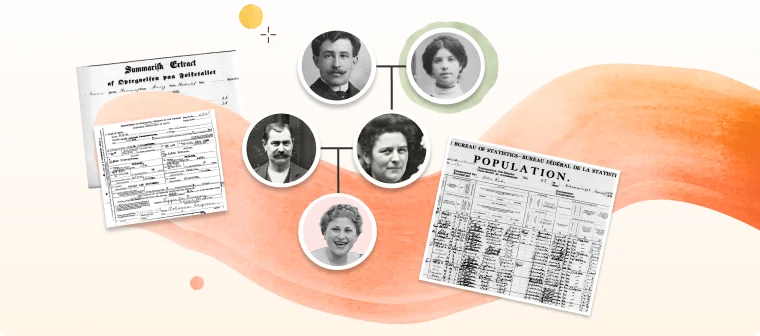
Explore historical records
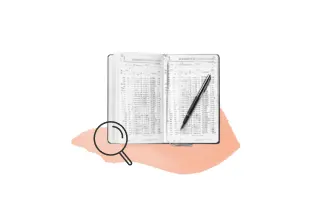
Explore 1,810,427,080 census and voter list records to get a detailed snapshot of your ancestors' lives. Discover names, ages, occupations, family relationships, residences, and much more.

Explore 4,647,704,406 birth, marriage, and death records. Uncover valuable details about major family milestones and find names, dates, places, occupations, and residences of your ancestors and relatives.

Search 266,544,192 military records and discover the stories of courage and resilience in your family history. Military records include enlistment dates, ranks, locations, and even physical descriptions.
Embark on a fascinating journey to discover your family history
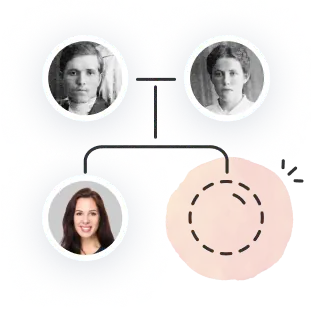
Start by adding a few names. Myheritage's automatic matching technology will help you expand your family tree and delight you with new discoveries.

Reveal your ethnic origins and find relatives you never knew existed with our simple DNA kit.
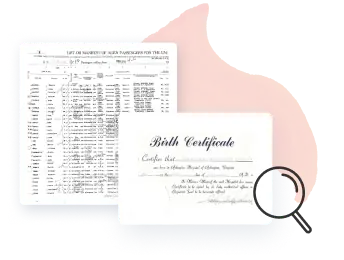
Dive into MyHeritage's international collection of 36.7 billion historical records - start with a name of an ancestor and see what our collections can reveal about your family history.
About MyHeritage

MyHeritage is the leading global platform for family history. It enriches the lives of people worldwide by enabling them to uncover more about themselves and where they belong. With a suite of intuitive products, billions of historical records, an affordable at-home DNA test, and AI-powered photo tools, MyHeritage creates a meaningful discovery experience that is deeply rewarding. The MyHeritage platform is enjoyed by tens of millions of people around the world who treasure and celebrate their heritage.

